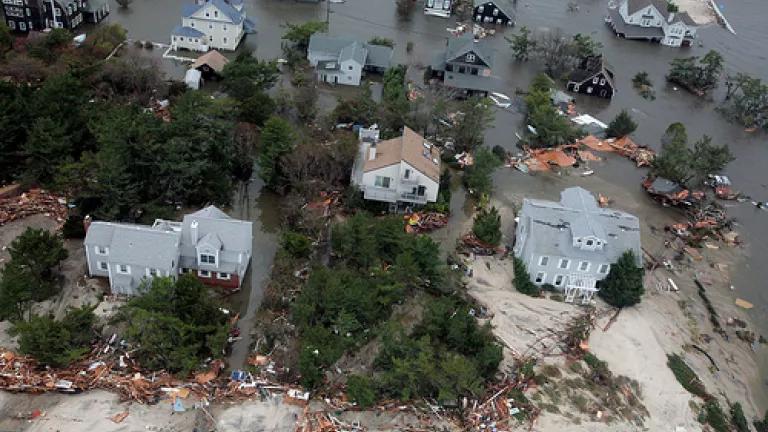
The hurricanes, droughts, wildfires and floods we once thought of simply as “natural” disasters are now increasingly man-made. That’s what I’ve been thinking as the one-year anniversary of Hurricane Sandy approaches. Climate change has accomplished that. And power plants are the largest US contributor to this worldwide problem, one that Sandy made only too real for us last year in the New York/New Jersey area, because they spew greenhouse gas pollution into our already overloaded atmosphere.
That’s why it makes sense for one of the states hardest hit Sandy, New Jersey, to rejoin a program that is making great strides in cutting climate-change pollution in our region. The Regional Greenhouse Gas Initiative (RGGI) is an innovative and much-lauded compact among nine Northeastern and Mid-Atlantic states to cut the climate-change pollution from power plants that is turbo-charging our weather. On top of that: RGGI is a job-creating, money-saving mechanism that keeps our energy dollars in-state and in the region, rather than sending them out-of-state, out of the region or even out of the country for fossil fuels.
The Jersey Shore after Superstorm Sandy. One year later, the state deserves a plan that helps address climate change. (US Air Force Photo by Master Sgt. Mark C. Olsen.)
Now that the federal Environmental Protection Agency is developing new standards that will limit climate change pollution from power plants, RGGI is also a leg-up for participating states. (It’s unlikely EPA’s efforts will be impacted by yesterday’s US Supreme Court’s decision to review a relatively narrow question of law that relates to those regulations.)
New Jersey, which participated in the compact for the first two years of its existence, before Governor Christie pulled the state out in 2011, knows the many benefits RGGI has already brought to the Garden State. Devastated by Sandy and still recovering, it deserves more of them, and can get them, with the help of legislation in Trenton that would enable the state to rejoin RGGI.
If, in the midst of these reminders of climate change’s power, these facts about RGGI sound too good to be true, think again. Study after study has documented how the program has:
• helped cut carbon pollution in the region by 30 percent.
• added more than 23,000 job-years worth of employment to the participating states. (A job-year is just what it sounds like, by the way: one year’s worth of work.)
• will save consumers almost $1.3 billion on energy.
• and, has increased economic activity in the region by $2.36 billion.
RGGI works this particular magic by charging the polluters (power plants) for the amount of pollution they put into the air our kids breathe. It then reinvests those revenues in energy efficiency and other clean energy programs that not only cut carbon pollution but also return as much as three to four dollars for every dollar invested. Homes get weatherized, schools undergo cash-saving lighting retrofits, medical centers are supported in saving money on energy so they can put those same savings back into patient care. These benefits are expected only to increase under this year’s new, fine-tuned RGGI rules, which further cut carbon pollution; they’re slated to take effect this January.
Should New Jersey rejoin RGGI, the state will have more jobs for building contractors, plumbers, electricians and their employees who weatherize homes and upgrade commercial and industrial buildings. And more energy savings for homeowners, tenants and business owners across the state.
As EPA develops its power-plant pollution rules, states can take the lead in developing plans to fit the pollution standards. (These are called “state implementation plants” or SIPs, for all you wonks out there.) Participating in RGGI will likely be one way states can comply with these new rules. New Jersey already knows RGGI’s advantages. And it makes sense for the state to develop a SIP that fits into regional power markets, the ones that RGGI states already participate in.
As New Jerseyans across the state commemorate Superstorm Sandy’s one-year anniversary, they deserve a plan that helps address the losses that Sandy delivered. They deserve and want increased action on climate change.
The state legislature has the power to give that to them. Pending legislation in the state Assembly and the state Senate will enable the state to rejoin RGGI. Of course, no single state can solve climate change alone. But when states take collective action, we can get there, together.
